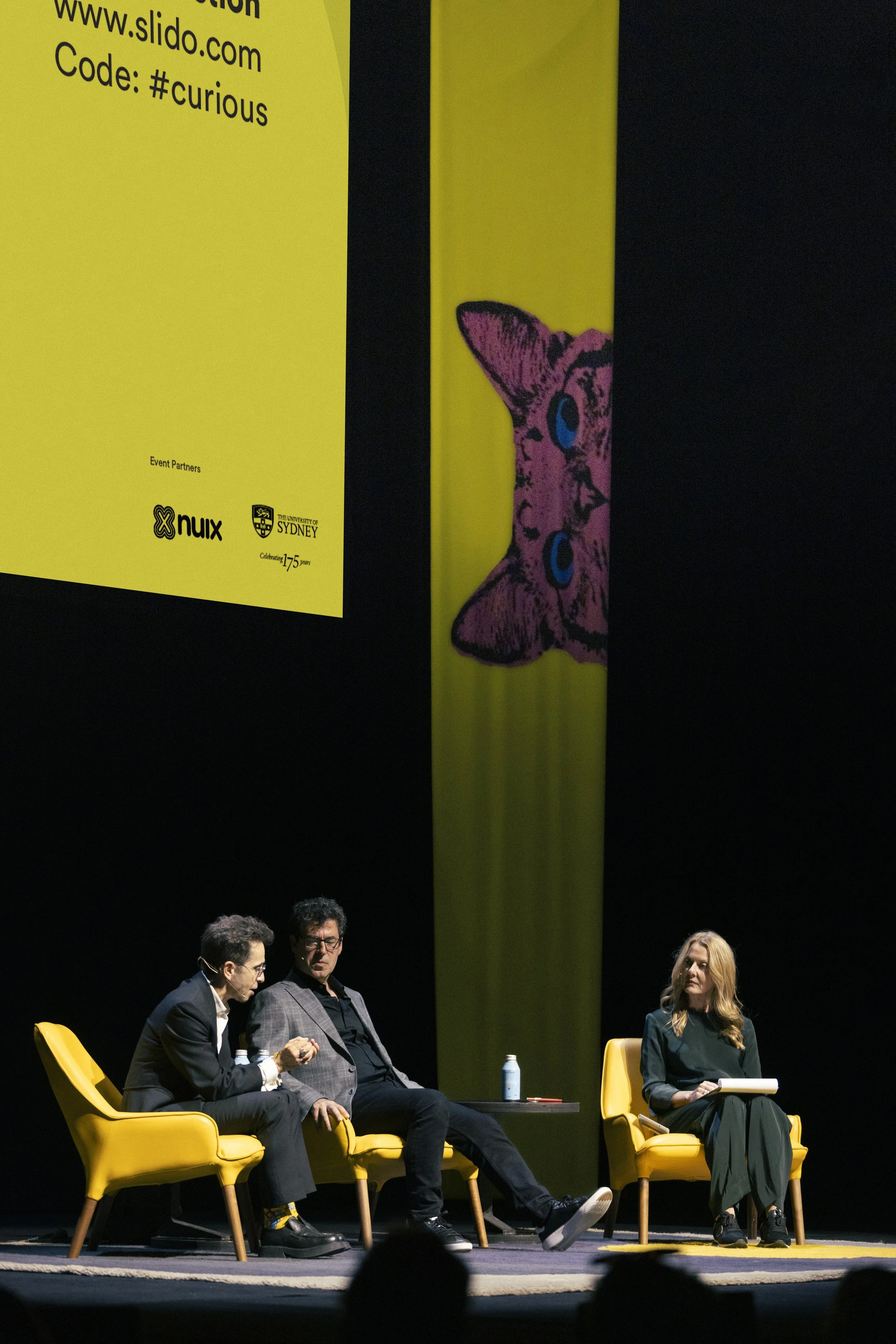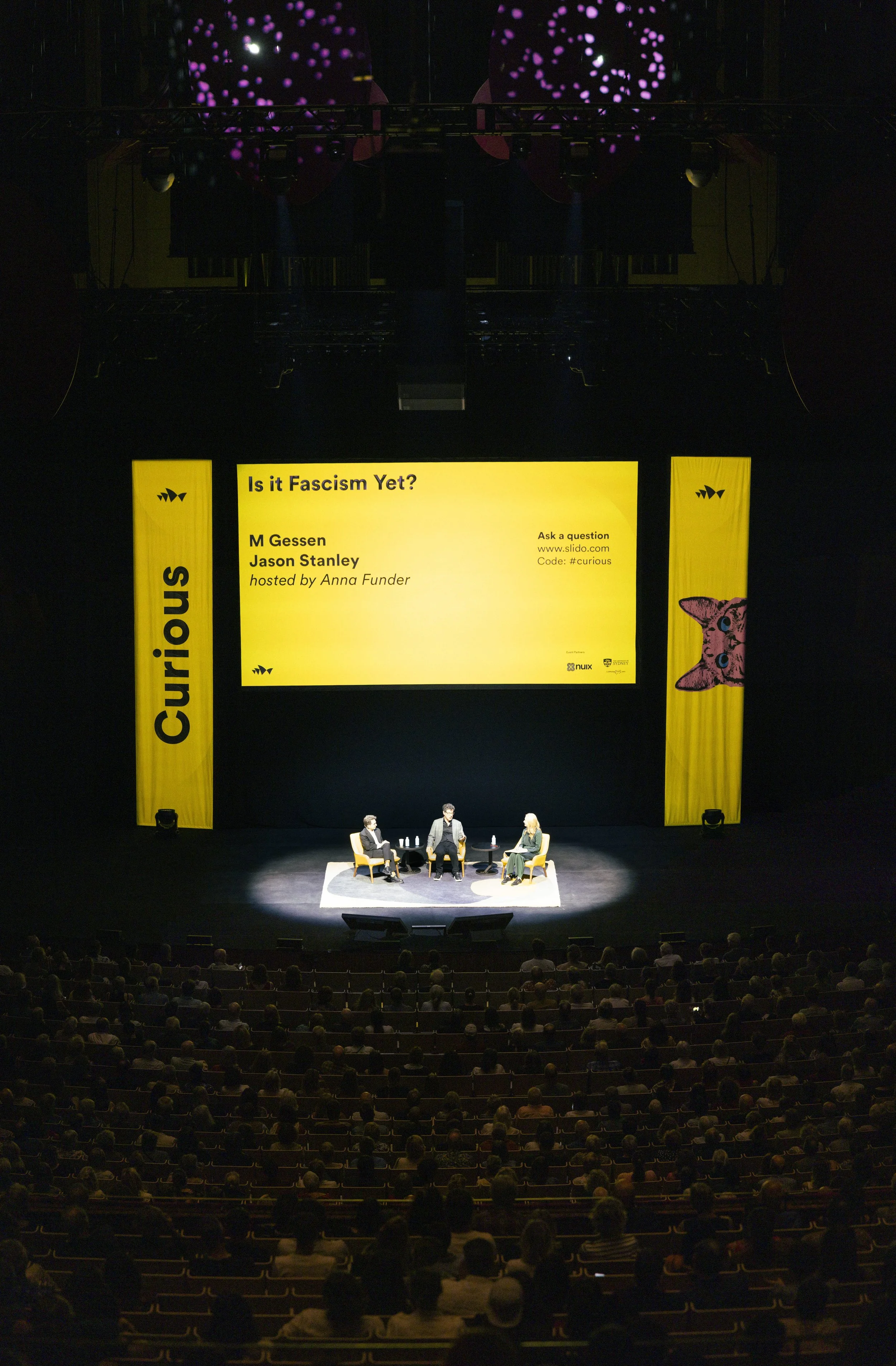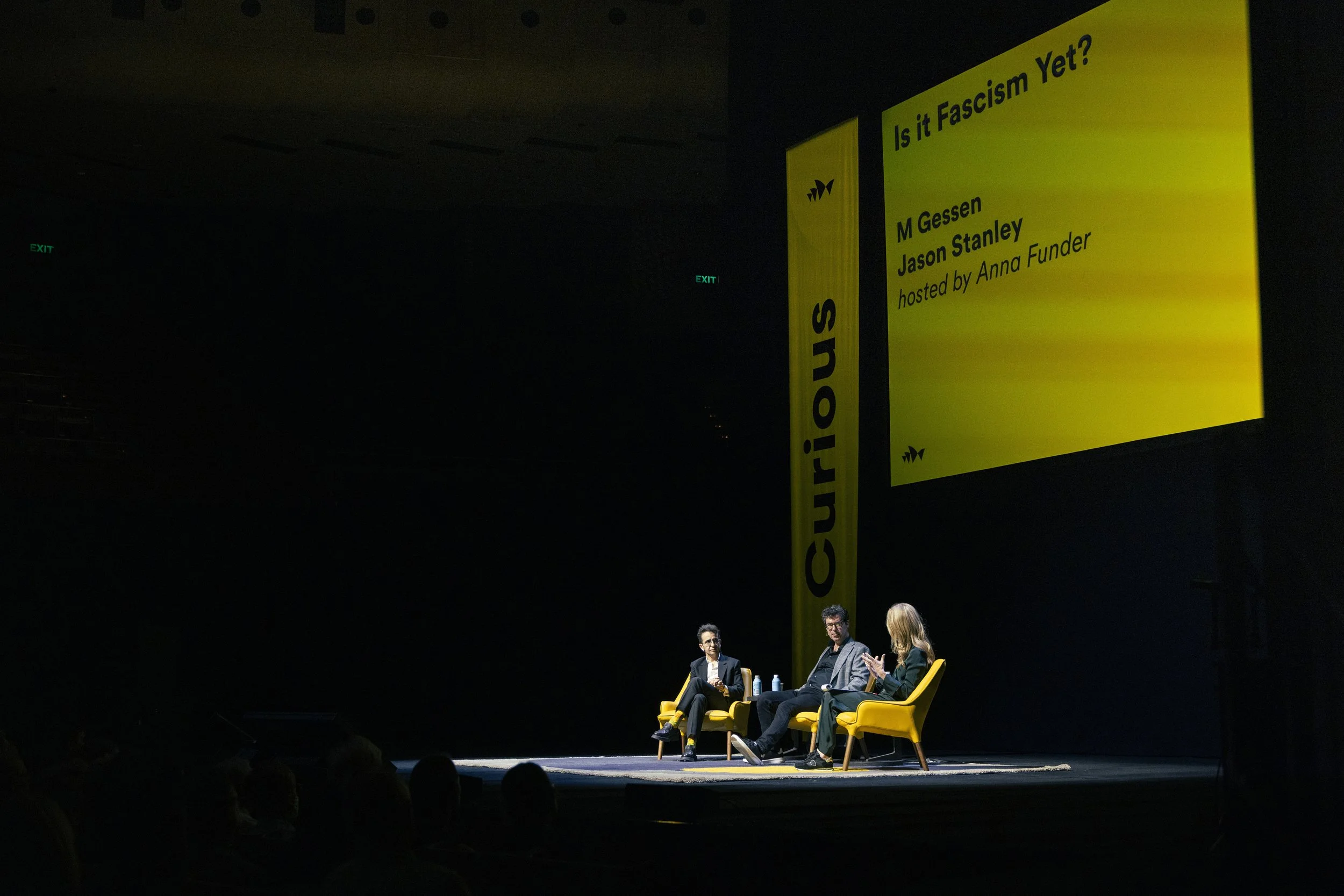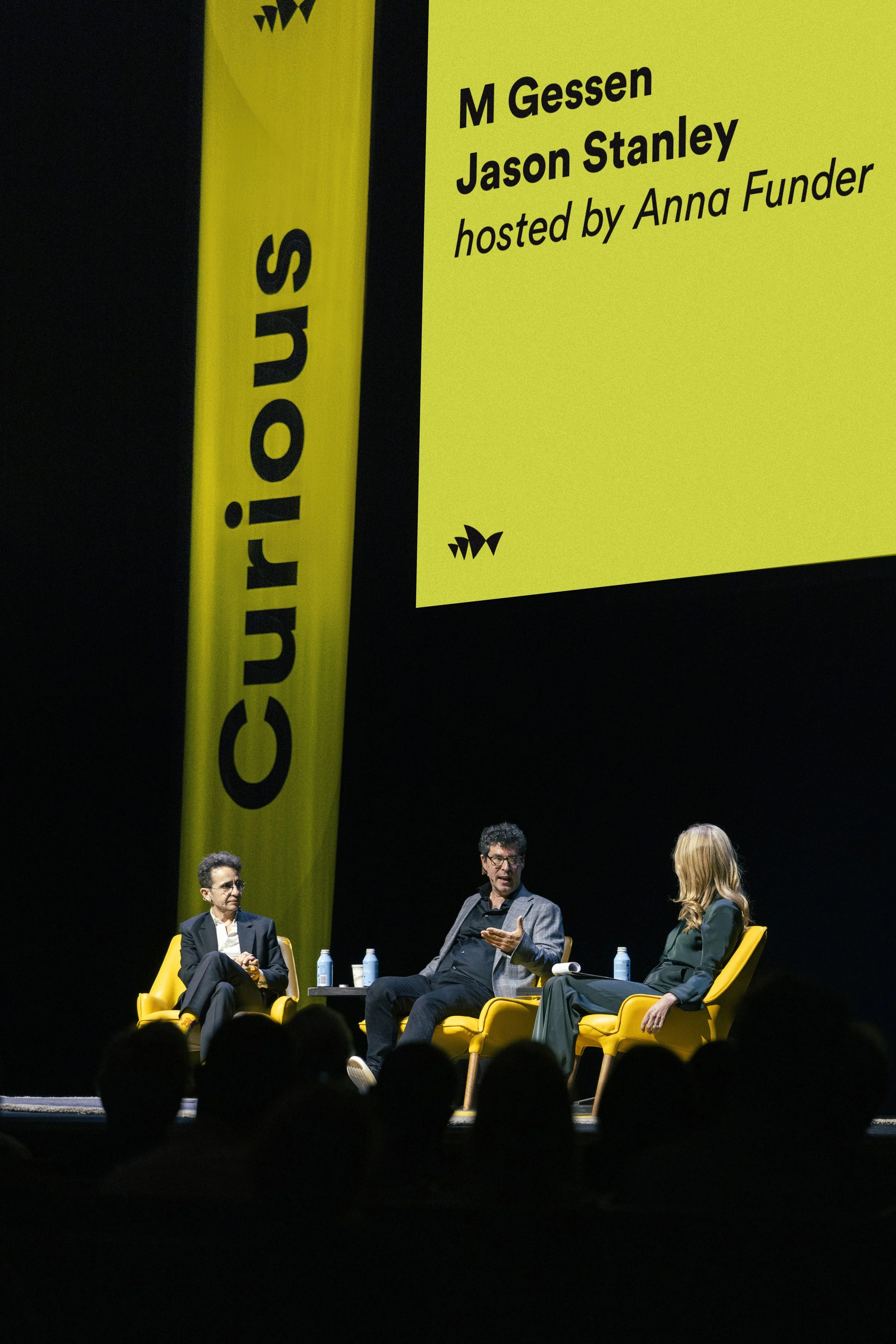It’s Definitely Fascism… Review of the Sydney Opera House’s ‘Is it Fascism Yet?’
‘Is It Fascism Yet?’ Photographed by David Boon
I entered the Sydney Opera House about three minutes before the talk began, practically throwing my bag through the security machine and taking the stairs to the main hall three at a time. The lower seating area had already filled up—the event was so popular that I had to climb even more stairs to the upper level to find an empty seat. I was eager to hear host Anna Funder (she/her) interview Masha Gessen (they/them) and Jason Stanley (he/him) in a talk named ‘Is it Fascism Yet?’, part of the Sydney Opera House’s ‘Curious’ series, held in partnership with Nuix and the University of Sydney.
Funder is an international human rights lawyer turned author who has written the Sunday Times Bestseller Wifedom: Mrs Orwell’s Invisible Life (2023) and Stasiland (2004) which won the Samuel Johnson Prize (now the Baillie Gifford Prize) for best non-fiction published in English. Gessen is an opinion columnist with the New York Times and the author of eleven books of nonfiction, including The Future Is History: How Totalitarianism Reclaimed Russia, which won the National Book Award in 2017. Stanley was the Jacob Urowsky Professor of Philosophy at Yale University and a member of the Justice Collaboratory at Yale Law School, before he recently immigrated to Canada due to the political conditions of the United States. Stanley researches authoritarianism, propaganda, mass incarceration, and free speech.
‘Is it Fascism Yet?’ analysed the currents of authoritarianism plaguing the United States. The discussion that unfolded between the three speakers was simultaneously eye-opening, depressing, and hilarious.
I was most impressed by the way Gessen, Stanley, and Funder managed to break down the historical and ideological conditions contributing to the current political ecosystem in America and the world. Each speaker turned complicated topics into understandable phenomena. Funder hosted the discussion with expertise, cutting the speakers off in the right places and circling back to critical discussion points including their lived experiences of authoritarianism, the intersection between colonialism, patriarchy, and fascism, and movements of resistance against these regimes.
Funder opened the discussion by referencing Goethe, noting that nations, like human beings, are unaware of the workings of human nature. Through this sentiment, Funder set the tone of the discussion ‘Is it Fascism Yet?’, insinuating that by the time we are consciously questioning the nature of a nation’s political environment, it has likely already deteriorated.
Gessen and Stanley were then asked to speak about their lived experiences and relations to authoritarian regimes. Gessen referenced one of their earlier books Ester and Ruzya: How My Grandmothers Survived Hitler’s War and Stalin’s Peace (2004) to illustrate how authoritarian regimes have influenced both sides of their family. Similarly, Stanley’s mother grew up in the Gulag, which was a system of forced labour camps maintained in the Soviet Union for over twenty years. Stanley’s family immigrated to the United States to escape these regimes; Gessen emigrated from Russia years later as their criticism of the Russian government threatened their safety. Diaspora is embedded in both Gessen and Stanley’s families, influencing their work considerably.
Funder moved on to ask the speakers point blank: has the United States descended into fascism? Stanley offered the words of his grandmother to illuminate his perspective, asserting that “It was much like [her] account of Berlin in the 30s. [Stanley] understood that maybe things will sort of be okay but the fact that people think things will be okay is not evidence at all” that they will be. It was certainly bleak to hear a tenured Yale professor utter these words. In the past few months I have hoped that the world’s political circumstances had been exaggerated by media outlets hoping to get extreme reactions out of people, but Stanley melted my optimism like boiling water being poured into a plastic bottle. Gessen responded to Funder and Stanley with a more optimistic outlook, stating that “familiarity can be deceptive. Just because it feels the same way doesn’t mean it is the same.” However, Gessen then immediately deflated my hopes with the slightly condescending quip:
"I also think that nothing in history is pre-determined and I think that we... well I think that the question ‘is it fascism yet’ is very easy to answer, not a complicated question and not worth an hour of our time actually. But the question, 'is what has happened in the US irreversible?' Is it going to lead to absolute catastrophe? We don't know that yet."
Lovely.
Just when I couldn’t feel any worse, Funder provided some more context of the events having occurred in the U.S. in the last few months. She listed how masked men without identification were sent from ICE to violently hurt immigrants, how troops were sent into Washington D.C., Elon Musk’s incorporation into the government, Trump’s use of the Department of Justice “to pardon his felon friends”, the revoking of documents of women’s achievements from institutions such as NASA, and the attempted incursions into Australia’s Pharmaceutical Benefits Scheme.
Stanley explained how the United States possesses the “ideological preconditions” for fascism, asserting the role that colonialism has played. “What you do to people elsewhere bounces back at you,” he exclaimed. The role of race as a mechanism to divide the working class was also clearly unpacked here. Stanley described how those in power are able to keep the working class immobilised by making conditions for white members of the working class slightly better than the conditions of black members of the working class. This way, white, working class people remain under the rule of those in power, unable to realise their path of resistance as black people remain even further oppressed. Funder noted that out of the developed countries in the world, the U.S. is the most unequal in terms of income distribution.
Gender was also discussed here. One of the most memorable ideas shared was that,
“Race is a mechanism used to divide class for power and gender is a similar mechanism used to divide bodies for power.”
Stanley noted that “You can’t separate patriarchy and racism,” touching on the intersectional nature of all forms of oppression. As a trans person, Gessen explained how it makes total sense that Trump has targetted the trans community because trans people defy the binary, challenging the labelling and categorising of society that benefits those in power.
Funder then eloquently directed the discussion towards the notion of resistance. She asked Gessen and Stanley, “Where is pushback coming from?” Gessen argued that it will be a non-institutional movement as universities and other institutions are acting in consistency with corporate values, so there is no motivation to resist. For instance, seeking to protect their profits, executives at public universities like Macquarie and UTS have cut courses and staff. As someone who was brought up to believe in the value of government institutions, I was intrigued. I understand that institutions, whether it be art galleries, universities, or others, are canonic, meaning they generally publish and display versions of history that are aligned with the views of those in power. This is problematic, reinforcing oppressive narratives that divide people. However, I have always championed the role of the institution in enabling access to critically evaluated art and education.
Instead of focusing on the institution, Stanley argued for a joyful ridiculing of those in power. He stated,
“Cultural pushback will be everyone laughing at them.”
This was a powerful message which reminded me of the theme of the 24th Biennale of Sydney: Ten Thousand Suns. Curated by co-artistic directors Cosmin Costinaş and Inti Guerrero, the Biennale sought to convey a message of “solar joy”, challenging the idea that the end of the world, or fascism in this case, has arrived and we are all doomed. Stanley reinvigorated the notion of joy as resistance within me and also prompted me to question whether contemporary moral panic surrounding the ‘end of democracy’ sidelines a legacy of oppression. Freedom has never universally existed in the United States or Australia; can we now consider democracy to be in peril when it has never truly existed for all? As I was leaving the Sydney Opera House, my friend brought up the metaphor of sunlight being the best disinfectant. Reflecting upon Stanley’s words and the Biennale’s theme, I felt hopeful again.
Trump will likely last a third term at least. But we must keep laughing at him. In this absurd political climate, solar joy offers a reevaluation of the current political paradigm as impermanent. I am championing joy as resistance.





